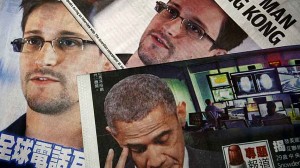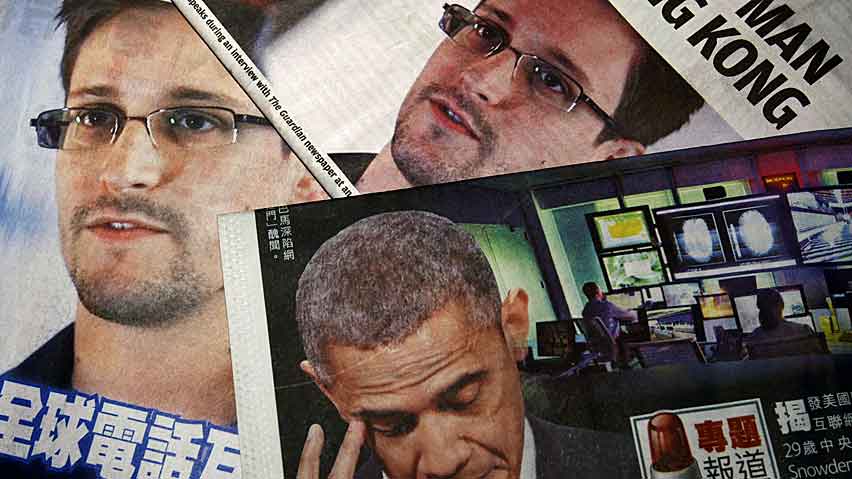Snowden chills in Hong Kong as we boil like frogs in a stew of NSA surveillance
Do you value national security? Do you want to live free of fear from random terrorist acts like the Boston Marathon bombing? Do you value your privacy? Should you be allowed to act in legal ways without others (namely, the government) digitally eavesdropping on your secrets?
A former data spy is asking us to decide where we stand on the spectrum separating security and privacy. Edward Snowden, 29, a former contractor to the National Security Agency (the guys and gals in charge of wire-tapping phones and internet traffic) and an employee of the CIA, leaked classified documents to reporters about two far-reaching U.S. surveillance programs. Fearing government reprisal, Snowden is hiding in Hong Kong, a country he believes has “a spirited commitment to free speech and the right of political dissent”.
Here’s what happened. Snowden provided reporters at The Guardian and The Washington Post with top-secret documents detailing two NSA surveillance programs being carried out by the U.S. Government, all without the average voter’s knowledge. One gathers hundreds of millions of U.S. phone records and the second allows the government to access nine U.S. Internet companies to gather all domestic Internet usage (your phone calls and emails, in other words). The intent of each program respectively is to use meta-data (information about the numbers being called, length of call, etc., but not the conversation itself, as far as we know) to detect links to known terrorist targets abroad and to detect suspicious behavior (by monitoring emails, texts, social media posts, instant messaging, chat rooms, etc.) that begins overseas.
In other words, close to 100% of our phone calls and internet communications are being digitally sniffed, even if we are innocent, to expose the .01% of terrorists among us. The means (ubiquitous digital surveillance) don’t seem to justify the ends (less terrorism), UNLESS it’s your child or spouse that dies in a 9/11 attack, and then you tend to fall on the side of national security while privacy seems little more than a luxury.
I’m simply saying that this isn’t a black or white argument. The right answer lies in the gray area between security and privacy – a place where checks and balances, bi-partisan oversight and transparency keep our leaders from overstepping the line that divides the highly effective from the clearly unethical.
The decision to go public on Snowden’s part came after many years of deliberation because he felt an obligation to inform the public of “the greatest danger to our freedom and way of life.” While Director of National Intelligence James Clapper counters that they do not target U.S. citizens, Snowden maintains that there is still a good chance the system will be abused. He states, “Even if you’re not doing anything wrong, you’re being watched and recorded. You simply have to eventually fall under suspicion from somebody, even by a wrong call, and then they can use the system to go back in time and scrutinize every decision you’ve ever made, every friend you’ve ever discussed something with.” In other words, if we don’t control the degree to which our private information is now collected in small, apparently insignificant pieces, the surveillance stew will have parboiled our privacy before we fully recognize what has happened.
Snowden’s actions have put the Obama administration into defensive mode, having to justify the legal grounds for secret phone snooping and data mining. Chief White House correspondent Major Garrett said, “…the White House has had to admit a politically and tactically startling truth: It conducts more surveillance than the Bush White House.
House Republican leader Rep. Eric Cantor, acknowledging that the NSA programs, as set up, were legal, said that an investigation this week on Capitol Hill into the NSA programs “will be very serious, obviously. We’ll be dealing with a balance between national security and safeguarding our civil liberties.”
Snowden has stated that he will not hide despite the fact that the government could charge him with treason and he may face years in prison for his actions. He is even aware there could be threats to his life, stating (I will be) “made to suffer for my actions, and that the return of this information to the public marks my end”. He is hopeful Hong Kong will refuse to extradite him, and he will “ask for asylum from any countries that believe in free speech and oppose the victimization of global privacy.”
At the risk of boiling a cliché to death, is Snowden a traitor, or just a sacrificial frog willing to take the heat on our behalf?
John Sileo is a keynote speaker and CEO of The Sileo Group, a privacy think tank that trains organizations to harness the power of their digital footprint. Sileo’s clients include the Pentagon, Visa, Homeland Security and businesses looking to protect the information that makes them profitable.
Sorry, comments for this entry are closed at this time.











No Comments Yet
You can be the first to comment!